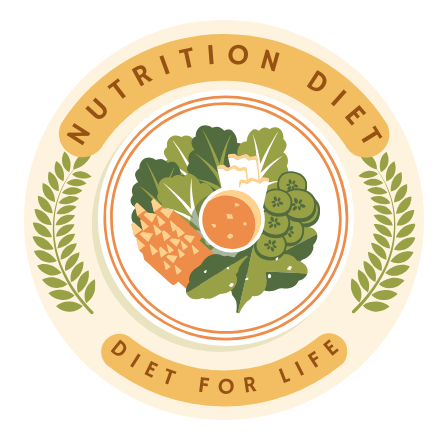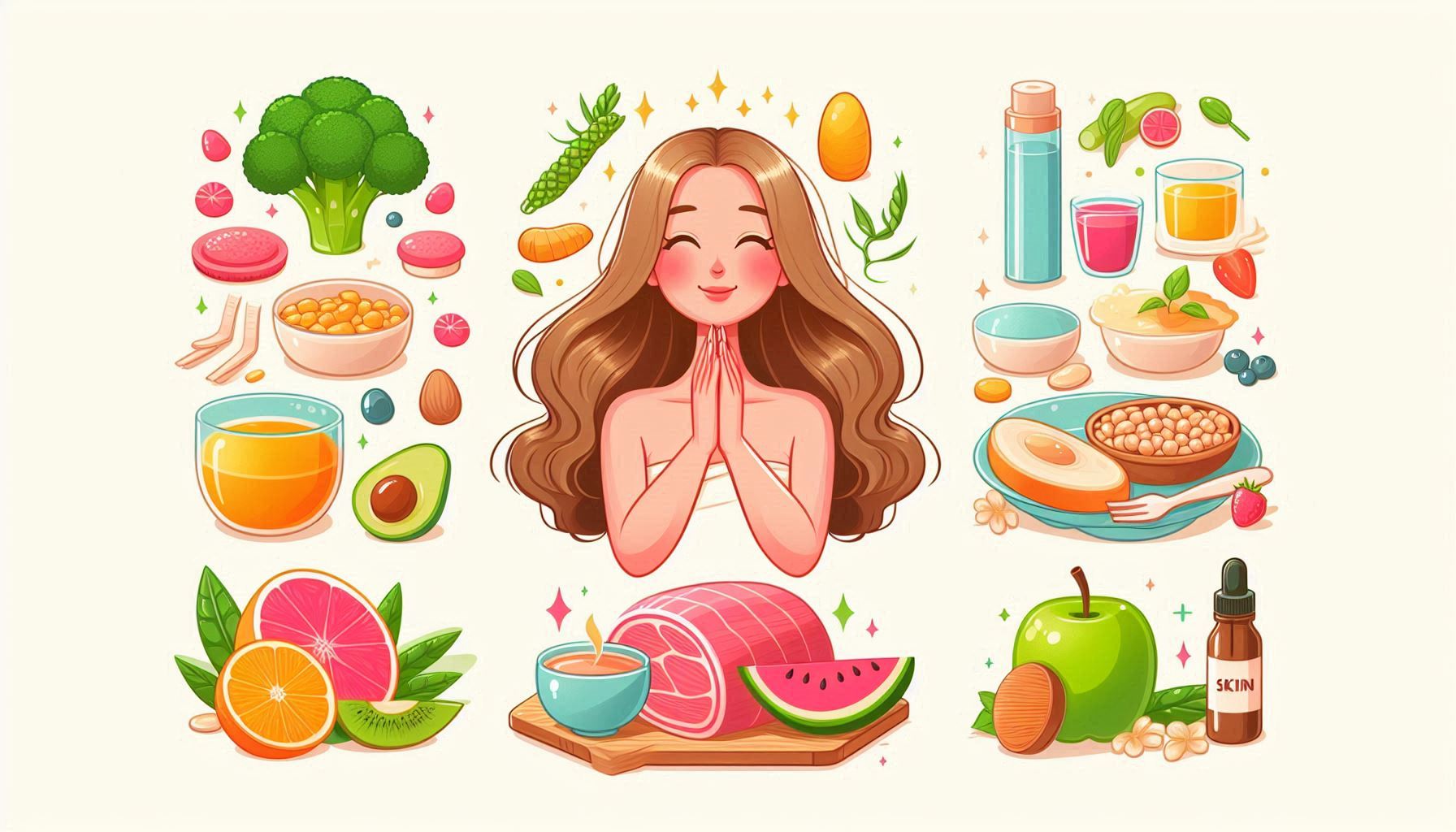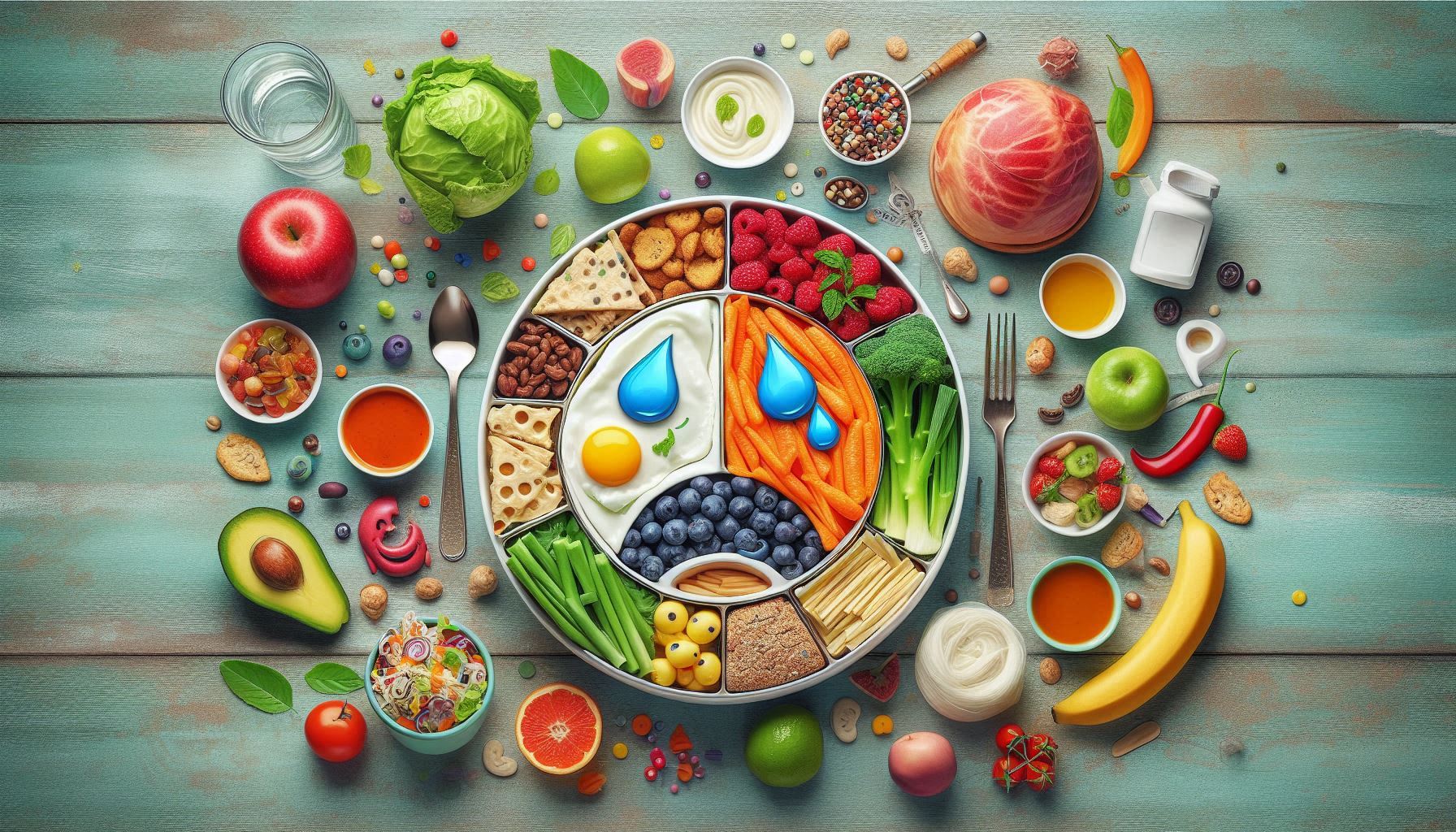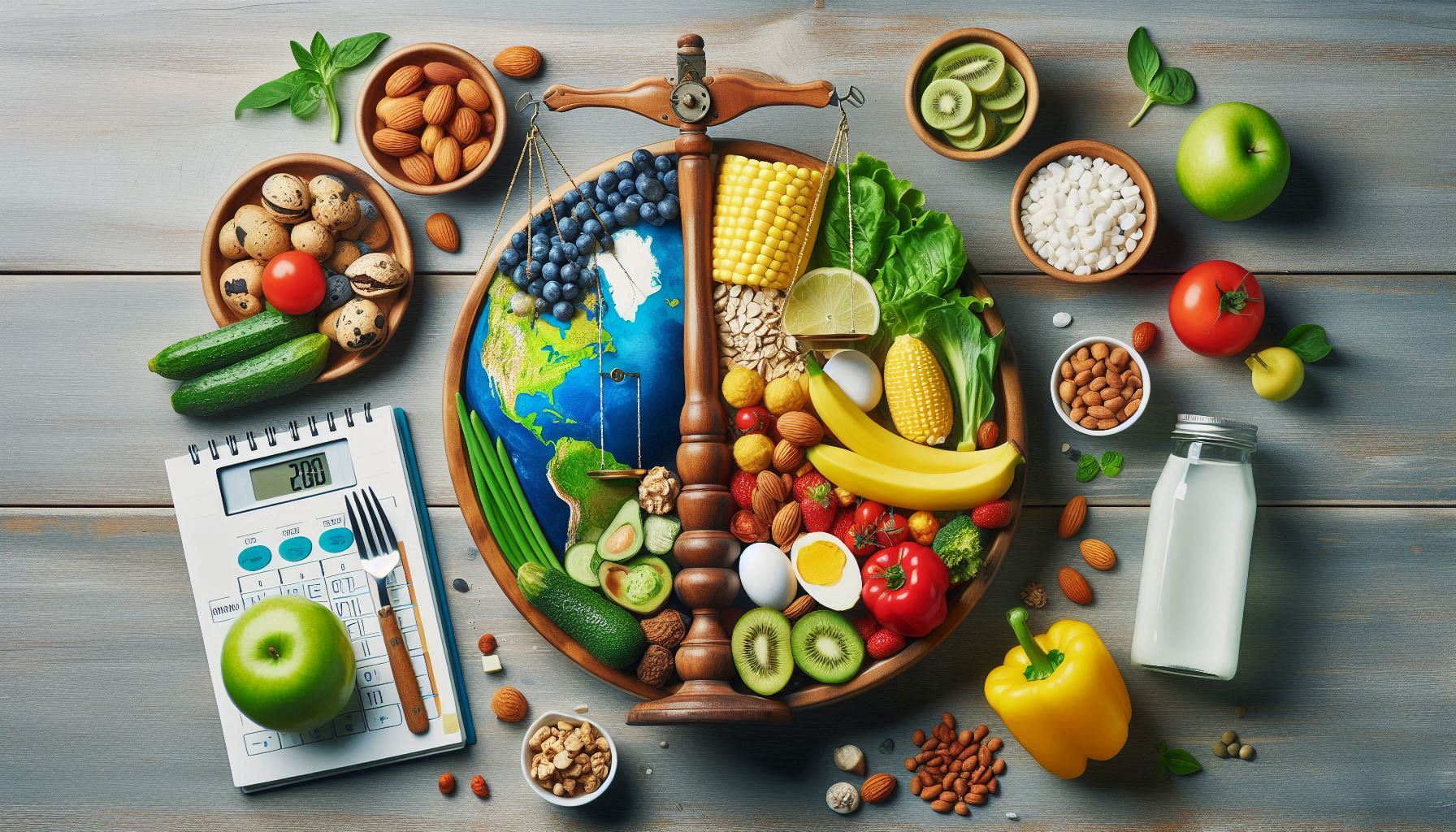Introduction
The appearance and health of your skin, hair, and nails are often considered the most visible indicators of your overall well-being. They reflect not only your genetic predisposition but also your lifestyle choices, environmental factors, and, importantly, your diet. Proper nutrition plays a pivotal role in maintaining healthy skin, hair, and nails by providing essential vitamins, minerals, antioxidants, and fatty acids that support their structure, strength, and function.
In this guide, we will explore the essential nutrients necessary for healthy skin, hair, and nails, the role of hydration, and how you can improve your beauty from within by incorporating the right foods into your diet. We will also discuss how deficiencies in key nutrients can impact the appearance and health of these body parts.
The Role of Nutrition in Skin Health
Your skin is the body’s largest organ, serving as a crucial barrier against environmental factors, harmful pathogens, and UV radiation. To maintain healthy skin, it’s essential to provide proper hydration, structural support, and a balanced intake of nutrients. These factors help preserve skin elasticity, prevent premature aging, and protect against common skin conditions like acne, eczema, and psoriasis. A nutrient-rich diet, along with adequate hydration, plays a key role in skin health, promoting its resilience, smoothness, and overall vitality. Consistently nourishing your skin from the inside out helps maintain its protective functions, ensuring it remains healthy and vibrant for years to come.
Key Nutrients for Healthy Skin:
- Vitamin C
Vitamin C is crucial for collagen production, which provides structure and firmness to the skin. It is also a powerful antioxidant that protects the skin from damage caused by free radicals and environmental stressors, such as pollution and UV rays.- Sources: Citrus fruits (oranges, grapefruits), strawberries, bell peppers, kiwis, and broccoli.
- Vitamin E
Vitamin E acts as a potent antioxidant that helps protect the skin from oxidative damage, reduces inflammation, and aids in wound healing. It also improves skin texture and provides moisture.- Sources: Nuts (almonds, hazelnuts), seeds (sunflower), spinach, and avocado.
- Vitamin A
Vitamin A plays a key role in skin cell production and turnover, ensuring that dead skin cells are shed and replaced with new, healthy ones. It also helps with acne prevention and may reduce the appearance of fine lines and wrinkles.- Sources: Carrots, sweet potatoes, spinach, and liver.
- Omega-3 Fatty Acids
Omega-3 fatty acids help maintain skin hydration, reduce inflammation, and support the skin’s natural barrier. These fats are essential for preventing dry, flaky skin and improving skin texture.- Sources: Fatty fish (salmon, mackerel, sardines), chia seeds, flaxseeds, and walnuts.
- Zinc
Zinc is essential for skin healing and regeneration. It has anti-inflammatory properties, helps reduce acne lesions, and supports the skin’s immune function.- Sources: Pumpkin seeds, chickpeas, lentils, shellfish, and beef.
- Biotin (Vitamin B7)
Biotin supports the metabolism of fatty acids, which are vital for maintaining healthy skin. It also helps in the regeneration of skin cells and may reduce inflammation.- Sources: Eggs, almonds, oats, and sweet potatoes.
- Collagen
Collagen is the structural protein that keeps your skin firm, plump, and elastic. As you age, collagen production decreases, leading to wrinkles and sagging. Consuming collagen-rich foods or supplements can help maintain skin elasticity and reduce the appearance of aging.- Sources: Bone broth, chicken skin, fish skin, and collagen supplements.
- Water
While not a nutrient in the traditional sense, water is vital for skin hydration. Dehydration can lead to dry, dull skin, and exacerbate skin conditions such as acne or eczema.- Recommendation: Aim to drink at least 8 glasses (2 liters) of water a day, more if you are physically active.
Food and Diet for Skin Health:
- Colorful Fruits and Vegetables: Aim to include a variety of brightly colored fruits and vegetables in your diet. These are rich in antioxidants, vitamins, and minerals that protect and nourish the skin.
- Healthy Fats: Incorporating healthy fats from sources like olive oil, avocado, and nuts can help your skin stay hydrated and supple.
- Whole Grains: Whole grains like quinoa, brown rice, and oats provide essential B vitamins and fiber, which support overall skin health.
Common Skin Problems and Their Nutritional Solutions:
- • Acne: Diets high in sugar and refined carbohydrates can trigger or worsen acne by increasing inflammation and insulin levels. Instead, opt for foods rich in zinc (such as pumpkin seeds, lentils) and omega-3 fatty acids (found in salmon, flaxseeds), which help reduce inflammation and support skin healing. These nutrients may help calm acne breakouts and promote clearer skin.
- Dry Skin: Omega-3 fatty acids, found in fatty fish, walnuts, chia seeds, and flaxseeds, are crucial for maintaining your skin’s hydration. These healthy fats help strengthen the skin’s barrier, locking in moisture and preventing dryness. Additionally, they can support the skin’s natural oils, promoting a soft, smooth texture and reducing the appearance of flaky, dry patches.
- Wrinkles and Fine Lines: As we age, collagen production decreases, contributing to wrinkles and fine lines. Boost your collagen synthesis by consuming collagen-rich foods like bone broth, along with vitamin C-rich foods (citrus fruits, strawberries), which help enhance collagen production, maintaining skin elasticity and reducing visible signs of aging.
Nutrition for Healthy Hair Growth
Hair is primarily made of keratin, a protein that relies on the nutrients you consume to remain strong and healthy. For optimal hair growth, it’s not just about the condition of the hair follicle, but also the overall health of your body. A well-balanced diet rich in essential vitamins, minerals, and proteins supports hair structure and growth. On the other hand, nutrient deficiencies—such as a lack of biotin, iron, zinc, or omega-3 fatty acids can lead to hair thinning, shedding, and even hair loss. Maintaining a healthy diet ensures your hair follicles receive the necessary nutrients to promote strong, vibrant hair growth and prevent damage.
Key Nutrients for Healthy Hair:
- Biotin
Biotin is perhaps the most well-known nutrient for hair health. It helps strengthen the hair shaft, reduce hair loss, and improve the elasticity of hair.- Sources: Eggs, salmon, nuts, and seeds.
- Iron
Iron is essential for healthy hair growth because it helps deliver oxygen to the hair follicles. An iron deficiency is one of the most common causes of hair thinning, particularly in women.- Sources: Red meat, spinach, lentils, and tofu.
- Vitamin D
Vitamin D plays a role in creating new hair follicles. A deficiency in vitamin D has been linked to hair loss conditions such as alopecia areata.- Sources: Fatty fish, mushrooms, fortified dairy products, and sunlight.
- Vitamin E
Vitamin E is an antioxidant that helps protect hair from oxidative stress and promotes healthy blood circulation to the scalp, which is essential for hair growth.- Sources: Almonds, sunflower seeds, spinach, and avocados.
- Omega-3 Fatty Acids
Omega-3s help nourish the scalp and promote healthy hair follicles. They also help reduce inflammation, which can contribute to hair loss.- Sources: Salmon, walnuts, flaxseeds, and chia seeds.
- Protein
Hair is made primarily of keratin, which is a protein. A lack of dietary protein can result in hair thinning and slower growth.- Sources: Lean meats, fish, eggs, legumes, and dairy.
- Zinc
Zinc is essential for hair growth and repair. A zinc deficiency can lead to hair loss, scalp infections, and poor hair texture.- Sources: Shellfish, chickpeas, pumpkin seeds, and beef.
- Folic Acid (Vitamin B9)
Folic acid supports healthy cell division, which is critical for hair growth. A deficiency in folic acid can cause hair thinning and slow hair growth.- Sources: Leafy greens, beans, lentils, and citrus fruits.
Food and Diet for Hair Health:
- Protein-rich foods: Hair requires protein for strength and growth, so include lean meats, legumes, and dairy in your diet.
- Leafy greens: Dark leafy greens like spinach, kale, and broccoli are rich in iron, vitamins A and C, which are all essential for hair health.
- Nuts and seeds: Nuts (especially almonds) and seeds (like pumpkin seeds and flaxseeds) are rich in zinc, omega-3 fatty acids, and biotin.
Hair Problems and Their Nutritional Solutions:
- Hair Loss: To prevent or manage hair loss, focus on foods rich in iron (spinach, lentils), zinc (pumpkin seeds, beef), and vitamin D (fatty fish, fortified products).
- Dry or Brittle Hair: Omega-3 fatty acids (salmon, flaxseeds) and vitamin E (almonds, avocados) help nourish the scalp and prevent dryness.
- Thinning Hair: Biotin-rich foods (eggs, almonds), protein, and iron can help stimulate hair growth and reduce thinning.
Nutrition for Strong Nails
Like hair, your nails are made of keratin, which requires proper nourishment to grow strong and healthy. Nutritional deficiencies can lead to brittle, weak nails that are prone to splitting or breaking.
Key Nutrients for Strong Nails:
- Biotin
Biotin is one of the most important nutrients for nail health. It helps strengthen nails, prevent splitting, and promote overall growth.- Sources: Eggs, almonds, sweet potatoes, and spinach.
- Protein
Protein is essential for the growth and integrity of your nails. A lack of protein can cause nails to become weak and brittle.- Sources: Chicken, fish, beans, and dairy products.
- Zinc
Zinc plays a crucial role in cell growth and division, which helps promote strong nails. A deficiency can result in white spots on the nails, and slower nail growth.- Sources: Pumpkin seeds, cashews, chickpeas, and beef.
- Iron
Iron deficiency can lead to spoon-shaped nails (koilonychia), a condition where the nails become concave and brittle.- Sources: Spinach, red meat, lentils, and tofu.
- Vitamin A
Vitamin A is essential for the growth and maintenance of tissues, including the nail beds. It helps support the production of keratin, making nails stronger.- Sources: Carrots, sweet potatoes, kale, and liver.
- Vitamin C
Vitamin C aids in the production of collagen, which supports the structure of your nails. It also helps protect nails from damage caused by free radicals.- Sources: Citrus fruits, strawberries, bell peppers, and broccoli.
- Omega-3 Fatty Acids
Omega-3s help keep the nail bed moisturized and prevent dryness, ensuring that nails grow strong and healthy.- Sources: Salmon, walnuts, flaxseeds, and chia seeds.
Food and Diet for Nail Health:
- Lean meats and legumes: To ensure your body gets enough protein for nail strength, include lean meats like chicken and turkey or plant-based proteins like beans and lentils.
- Nuts and seeds: Walnuts, almonds, and flaxseeds are rich in biotin, omega-3 fatty acids, and zinc, all of which are important for nail health.
- Fruits and vegetables: Ensure you get a variety of fruits and vegetables, particularly those high in vitamins A, C, and E, to promote healthy nail growth.
Common Nail Problems and Their Nutritional Solutions:
- Brittle Nails: Include more biotin-rich foods like eggs, almonds, and sweet potatoes. Omega-3 fatty acids (flaxseeds, salmon) will also help maintain hydration.
- Slow Nail Growth: Iron-rich foods (spinach, lentils) and protein from lean meats or legumes can boost nail growth.
- Discolored Nails: Ensure adequate vitamin C (citrus fruits, bell peppers) and zinc (pumpkin seeds, chickpeas) intake to improve nail color and health.
Conclusion
The health of your skin, hair, and nails is directly influenced by your overall nutrition. A well-balanced diet, rich in essential vitamins, minerals, and healthy fats, is crucial for enhancing your natural beauty and preventing common issues such as dryness, breakage, and thinning. Nutrients like biotin, vitamin C, omega-3 fatty acids, and zinc play key roles in maintaining the strength, elasticity, and appearance of your skin, hair, and nails. These nutrients support collagen production, promote hair growth, and prevent brittleness, ensuring that your skin and nails stay resilient and your hair remains shiny and strong.
To nourish your body and support these vital areas, incorporate a variety of nutrient-dense foods into your diet. Colorful fruits and vegetables, lean proteins, healthy fats, and whole grains provide the necessary building blocks for healthy skin, hair, and nails. Staying hydrated is equally important, as water helps maintain moisture levels and promotes a glowing complexion. Additionally, limiting alcohol consumption and avoiding smoking can further enhance skin health and prevent premature aging. By prioritizing proper nutrition and adopting a healthy lifestyle, you can achieve vibrant, youthful skin, strong nails, and healthy hair, all of which reflect your overall well-being and vitality.
SOURCES
Harris, M. R. (2015). Nutrition for skin health: Vitamins, antioxidants, and their role in skincare. New York: HarperCollins Publishers.
Koch, G., & Lundström, J. (2016). The impact of diet on skin aging and skin health: A review of current evidence. Journal of Dermatological Science, 83(2), 101–108.
Sharma, P., Puri, A., & Nayak, M. (2017). The role of biotin in skin, hair, and nail health. International Journal of Dermatology and Cosmetology, 21(4), 301-315.
Cai, Z., & Zhang, R. (2018). The effect of omega-3 fatty acids on skin hydration and anti-inflammatory properties: A systematic review. Journal of Clinical Nutrition, 49(1), 23-31.
Pappas, A. M., Anderson, L. L., & Tobias, J. K. (2019). Vitamin C in skincare: From inside-out protection to external applications. Dermatology and Therapy, 39(3), 58-67.
Choudhury, S., & Ghosh, S. (2016). The role of protein and amino acids in hair growth. Journal of Clinical Dermatology and Aesthetic Medicine, 8(2), 88–95.
Zhao, Q., & Li, H. (2017). Zinc and its importance in hair health: A critical review. Journal of Dermatological Research, 58(5), 411–420.
Smith, L. R., & Gerson, C. A. (2014). Understanding the biochemistry of collagen and skin aging. Cosmetic Dermatology, 27(6), 489-495.
Burr, H. M., & Anderson, G. A. (2018). Iron deficiency and its implications for skin and hair growth: A clinical overview. Clinical Dermatology Review, 21(2), 52-58.
Tanaka, K., & Fujita, S. (2017). The influence of biotin and other B vitamins on nail health. Journal of Cosmetic Dermatology, 36(1), 95-103.
Henderson, C. M., & Willis, E. J. (2020). The significance of water intake in maintaining skin hydration and elasticity. Journal of Nutritional Science, 14(4), 267-274.
Patel, K., & Jackson, S. P. (2016). Impact of dietary fatty acids on skin barrier function and health. Journal of Lipid Research, 57(3), 443-450.
Jackson, R. D., & Harrison, T. L. (2019). The science of collagen supplementation and its effects on skin, hair, and nails. Journal of Cosmetic Science, 42(5), 129–137.
Foley, J. T., & Martin, J. S. (2018). Vitamins and minerals: Nutrients that support the skin, hair, and nails. Journal of Dermatology Nutrition, 14(3), 103–110.
Boehringer, L. E., & Kidd, A. F. (2020). The relationship between diet, digestion, and dermatological conditions. International Journal of Dermatology and Nutrition, 9(6), 235-240.
HISTORY
Current Version
November 20, 2024
Written By:
SUMMIYAH MAHMOOD




